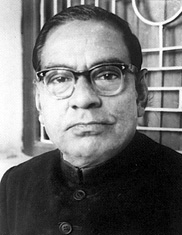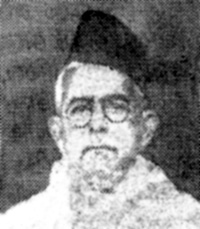Related Research Articles

West Bengal is a state in the eastern portion of India. It is situated along the Bay of Bengal, along with a population of over 91 million inhabitants within an area of 88,752 km2 (34,267 sq mi). West Bengal is the fourth-most populous and thirteenth-largest state by area in India, as well as the eighth-most populous country subdivision of the world. As a part of the Bengal region of the Indian subcontinent, it borders Bangladesh in the east, and Nepal and Bhutan in the north. It also borders the Indian states of Jharkhand, Odisha, Bihar, Sikkim and Assam. The state capital is Kolkata, the third-largest metropolis, and seventh largest city by population in India. West Bengal includes the Darjeeling Himalayan hill region, the Ganges delta, the Rarh region, the coastal Sundarbans and the Bay of Bengal. The state's main ethnic group are the Bengalis, with the Bengali Hindus forming the demographic majority.

Irfan Habib is an Indian historian of ancient and medieval India, following the methodology of Marxist historiography in his contributions to economic history. He identifies as a Marxist and is well known for his strong stance against Hindutva and Islamic fundamentalism. He has authored a number of books, notably the Agrarian System of Mughal India, 1556–1707, an Atlas of the Mughal Empire: Political and Economic Maps With Detailed Notes, and an Atlas of Ancient Indian History. As the general editor, he is also the driving force behind the A People's History of India series, volumes of which continue to be released.

Abul Kasem Fazlul Huq, popularly known as Sher-e-Bangla, was a Pakistani Bengali lawyer and politician who presented the Lahore Resolution which had the objective of creating an independent Pakistan. He also served as the first and longest Prime Minister of Bengal during the British Raj.

The Bengali Brahmins are Hindu Brahmins who traditionally reside in the Bengal region of the Indian subcontinent, currently comprising the Indian state of West Bengal and the country of Bangladesh.

Abul Mansur Ahmad, born Ahmad Ali Farazi, was a Bangladeshi politician, writer, and journalist.
Barnita Bagchi is a Bengali-speaking Indian feminist advocate, historian, and literary scholar. She is a faculty member in literary studies at Utrecht University, and was previously at the Institute of Development Studies, Kolkata at the University of Calcutta. She was educated at Jadavpur University, in Kolkata, St Hilda's College, Oxford, and at the Trinity College, Cambridge.
Dineshchandra Sircar (1907–1985), also known as D. C. Sircar or D. C. Sarkar, was an epigraphist, historian, numismatist and folklorist, known particularly in India and Bangladesh for his work deciphering inscriptions. He was the Chief Epigraphist of the Archaeological Survey of India (1949–1962), Carmichael Professor of Ancient Indian History and Culture at the University of Calcutta (1962–1972) and the General President of the Indian History Congress. In 1972, Sircar was awarded the Sir William Jones Memorial Plaque.

Mohammad Akram Khan was a Bengali journalist, politician and Islamic scholar. He was the founder of Dhaka's first Bengali newspaper, The Azad. He was among the founders of Jamiat Ulama-e-Hind.

Munīruzzamān Khān Islāmābādī, also known by the epithet Biplobi Maulana, was a Muslim philosopher, nationalist activist and journalist from Islamabad in Bengal Presidency, British India. He was among the founders of the Jamiat Ulama-e-Hind.

Anjuman-i-Ulama-i-Bangala, was an association of Muslim religious leaders in British India's Bengal Presidency. It later formed a branch of the Jamiat Ulema-e-Hind by the name Jamiat Ulema-e-Bangala in 1921.
Nisith Ranjan Ray was an Indian historian, social activist and the founder of the Society for Preservation, Calcutta, an organisation working for the preservation of the cultural heritage of Kolkata.
Janab A.M.A. Zaman was an Indian politician and trade unionist. As of 1936 he served as councillor in the Calcutta Municipal Corporation. He won the Hooghly labour seat in the 1936–1937 Bengal Legislative Assembly election. At the time he belonged to the Congress Socialist Party, but he was known for shifting party affiliations frequently.
Dilip Bagchi was a Bengali mass singer, educationist and political activist. He was an active member of Indian People's Theatre Association of West Bengal.
The Bengal Provincial Muslim League (BPML) was the branch of the All India Muslim League in the British Indian province of Bengal. It was established in Dacca on 2 March 1912. Its official language was Bengali. The party played an important role in the Bengal Legislative Council and in the Bengal Legislative Assembly, where two of the Prime Ministers of Bengal were from the party. It was vital to the creation of the Dominion of Pakistan, particularly after its election victory in 1946.
Bangiya Mussalman Sahitya Samiti is a historic Bengali literary society that was founded in 1911 and was associated some of most well known literary figures of that era.
Muhammad Reazuddin Ahmad (1861–1933) was a Bengali Muslim writer, journalist, and thinker.
Islam Pracharak was a historic monthly Bengali magazine founded in the late 19th century.
Mohammad Rowshan Ali Chowdhury was a Bengali journalist, writer, poet and politician.
Muhammad Abdullah al-Baqi was a Bengali Islamic scholar, writer and politician. As a member of the Central Legislative Assembly, he played an active role in the Indian independence movement. He was a prominent leader of the Ahl-i Hadith movement in North Bengal, and played a significant roles in pre-partition Ahl-i Hadith conferences.
The Kohinoor was a Bengali language newspaper, first published in July 1898. Initially focusing on miscellaneous topics such as Islamic culture, its third relaunch was a pivot of Hindu-Muslim harmony. The paper targeted both Hindu and Muslim clientele.
References
- ↑ Isalāma, Mustāphā Nūraula (1973). Bengali Muslim public opinion as reflected in the Bangali press, 1901-1930. Bangla Academy. p. 55. Retrieved 13 August 2018.
- ↑ Trivedi, Raj Kumar (1994). The Critical Triangle: India, Britain, and Turkey, 1908-1924. Publication Scheme. ISBN 9788185263915.
- ↑ Congress, Indian History (1985). Proceedings - Indian History Congress. Indian History Congress. p. 573. Retrieved 13 August 2018.
- ↑ Quayyum, Naheed. "Soltan". Banglapedia. Retrieved 13 August 2018.
- ↑ Basu, Mrinal Kumar (1990). Rift and reunion: contradictions in the Congress, 1908-1918. K.P. Bagchi & Co. p. 136. ISBN 978-81-7074-051-3 . Retrieved 13 August 2018.
- ↑ Sarkar, Chandiprasad (1991). The Bengali Muslims: A Study in Their Politicization, 1912-1929. K.P. Bagchi & Co. p. 256. ISBN 978-81-7074-096-4 . Retrieved 13 August 2018.